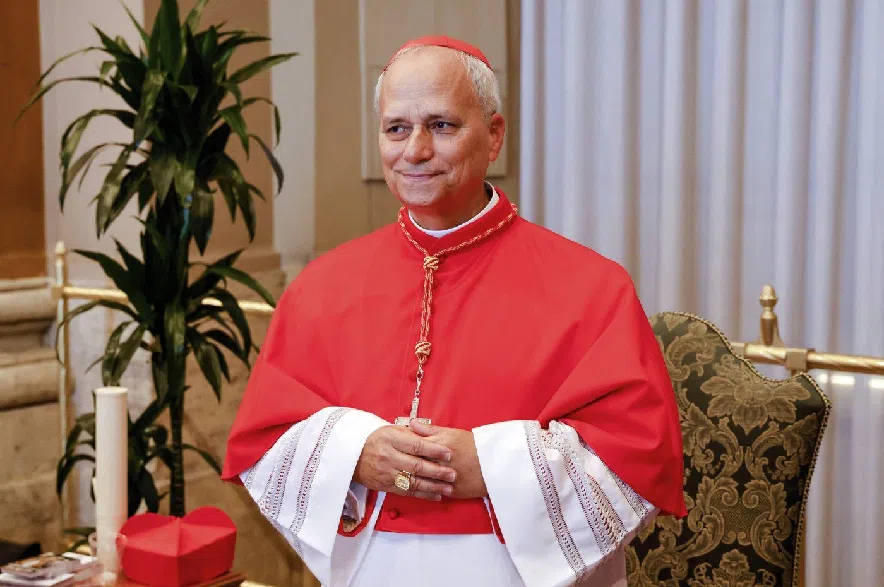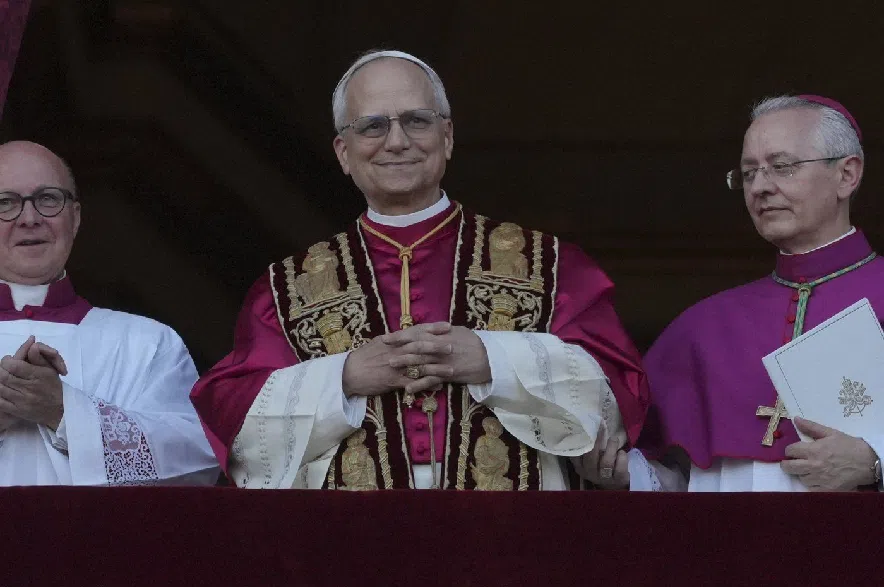VATICAN CITY (AP) — Robert Prevost, an missionary who spent his career ministering in Peru and took over the Vatican’s powerful office of bishops, was elected the first pope from the United States in the 2,000-year history of the Catholic Church.
Prevost, a 69-year-old member of the Augustinian religious order, took the name Leo XIV.
Read More:
- White smoke pours out of Sistine Chapel chimney, signaling election of new pope
- ‘Commitment to hope’: Sask. bishop reflects as cardinals meet to choose next pope
- Hundreds pay respect to Pope Francis at service in Saskatoon
In his first words as Pope Francis’ successor, uttered from the loggia of St. Peter’s Basilica, Leo said, “Peace be with you,” and emphasized a message of peace, dialogue and missionary evangelization. He wore the traditional red cape of the papacy — a cape that Francis had eschewed on his election in 2013.
Prevost had been a leading candidate for the papacy except, but there had long been a taboo against a U.S. pope, given the country’s geopolitical power already wielded in the secular sphere. But Prevost, a Chicago native, was seemingly eligible because he’s also a Peruvian citizen and lived for years in Peru, first as a missionary and then as an archbishop.
Pope Francis clearly had his eye on Prevost and in many ways saw him as his heir apparent. He brought Prevost to the Vatican in 2023 to serve as the powerful head of the office that vets bishop nominations from around the world, one of the most important jobs in the Catholic Church. And in January he elevated him into the senior ranks of cardinals. As a result, Prevost had a prominence going into the conclave that few other cardinals had.

Cardinal Robert Francis Prevost, prefect of the Dicastery for Bishops, stands for a portrait at the end of the consistory where Pope Francis elevated 21 new cardinals in St. Peter’s Square at the Vatican, Sept. 30, 2023. (AP Photo/Riccardo De Luca, File)
The crowd in St. Peter’s Square erupted in cheers when white smoke poured out of the Sistine Chapel on the second day of the conclave. Priests made the sign of the cross and nuns wept as the crowd shouted “Viva il papa!”
Waving flags from around the world, tens of thousands of people waited to learn who had won and were shocked when an hour later, the senior cardinal deacon appeared on the loggia and said “Habemus Papam!” and announced the winner was Prevost.
He spoke to the crowd in Italian and Spanish, but not English.
The last pope to take the name Leo was Leo XIII, an Italian who led the church from 1878 to 1903. That Leo softened the church’s confrontational stance toward modernity, especially science and politics and laid the foundation for modern Catholic social thought, most famously with his 1891 encyclical Rerum Novarum, which addressed workers’ rights and capitalism.
Saskatchewan bishops shocked by the quick vote
Donald Bolen, Archbishop of Regina, said he was shocked an American Pope was selected, but was impressed with how Pope Leo introduced himself.
“He made a decision, even in his opening remarks, to indicate that he’s really coming with a worldwide experience,” he said.
“He spoke firstly Italian, which is normal at St. Peter’s, and in Rome, but then when he asked permission to speak another language, it was Spanish, where he served as a missionary for many years in Peru.”
Bolen believes that Leo will try to build on Pope Francis’s legacy.
“He did give us some indications in his opening reflections, where he talked explicitly about Pope Francis,” he said.
“(He) spoke about peace, spoke about justice, spoke about the love of God, spoke about dialogue, spoke about walking together in a synodal way. All those keys of Pope Francis’ pontificate.”
This is also the first time since 1903 that a Pope will assume the name Leo, and Bolen said this could tell us a bit about how Leo will lead.
“The most recent Pope Leo, Leo XIII, published a key document really moving us on a path of social justice,” Bolen said.
“The first Catholic social encyclical, which really talks about how the church is called to reach out to the poor. So I think that would be part of the choice of the name Leo as well.”
It only took two days for the group of Cardinals to come to a decision, and that shocked Bolen.
“To get two-thirds majority when you’ve got 133 cardinals who often don’t know each other beforehand, I thought that was very quick,” he said.
This is something that Saskatoon Bishop Mark Hagemoen agreed with.
“I was certainly surprised that this happened with relatively few votes,” he said. “I thought it would go at least another day, so it is quite a surprise.”
Hagemoen said his church wasn’t prepared for the announcement.
“Ironically, we were having a professional day for our Catholic staff,” he said. “Of course, in the middle of the retreat, where we’re trying to pull away from (social) media and all that stuff, somebody caught the white smoke announcement. So there’s no way you’re going to keep people away from their cell phones then.”
— with files from 650 CKOM’s Will Mandzuk











